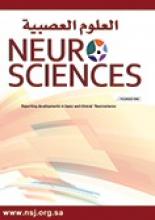Abstract
OBJECTIVE: To determine the relationship between nurse workload and multiresistant bacteria colonization or infection (MRB+) in a neurology intensive care unit (ICU).
METHODS: We studied the relationship between nurse workload and MRB+ development in patients who were hospitalized in Dicle University Neurology Department ICU, Turkey during a 6-month period from November 15, 2003 to April 15, 2004. The intensity of workload and procedures applied to the patients were scored with the Project de Recherche en Nursing (PRN) and the Omega scores.
RESULTS: Of 138 patients followed, 71 (51.4%) were female and 67 (48.6%) were male. The mean age of females was 65.6+/-6.7 years, and of males was 62.2+/-15.8 years. The mean time of hospitalization in the ICU was 13+/-7.6 days. In 26 (18.8%) cultures taken from patients, multiresistant bacteria (MRB) were demonstrated. The development of MRB+ infection was correlated with length of stay (LOS), Omega 2, Omega 3, Total Omega, daily PRN, and total PRN (p<0.05). There was no correlation between development of MRB+ infection with gender, age, APACHE-II and Omega 1 scores (p>0.05). In the PRN system, when the workload of nurses was compared, it was seen that in the MRB colonized patient group, the workload of nurses was meaningfully higher than the MRB patient (-) group (p<0.001).
CONCLUSION: As a result, the risk of MRB+ development in the ICU is directly proportional to understaffing, increased nurse workload, LOS, and procedures applied to patients. In management of nosocomial infection, it is crucial to increase the number of nurses in the ICU, and thus, decrease the workload.
- Copyright: © Neurosciences
Neurosciences is an Open Access journal and articles published are distributed under the terms of the Creative Commons Attribution-NonCommercial License (CC BY-NC). Readers may copy, distribute, and display the work for non-commercial purposes with the proper citation of the original work.






